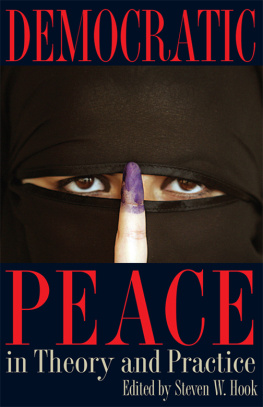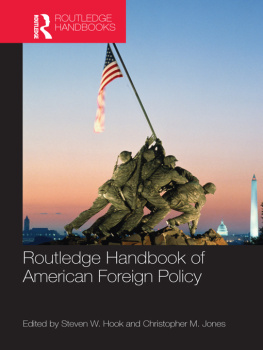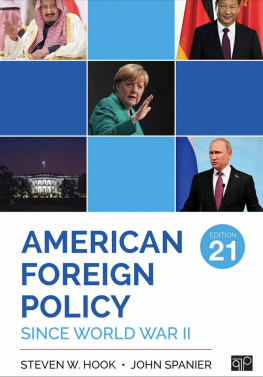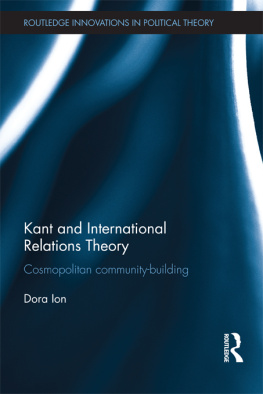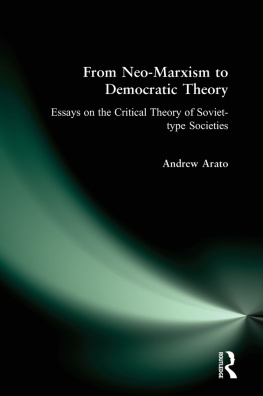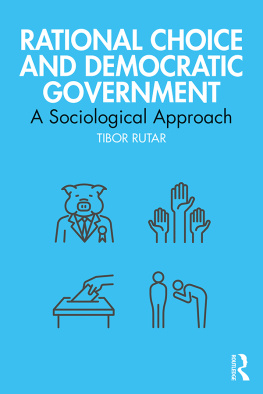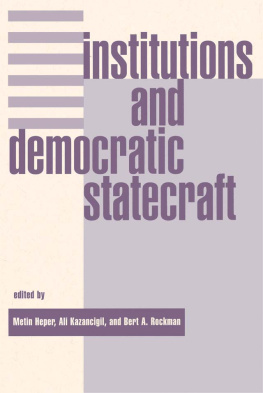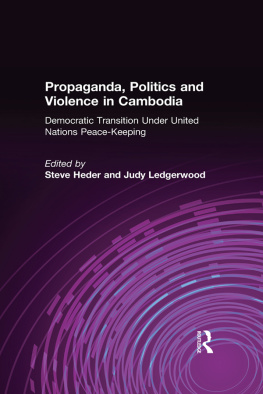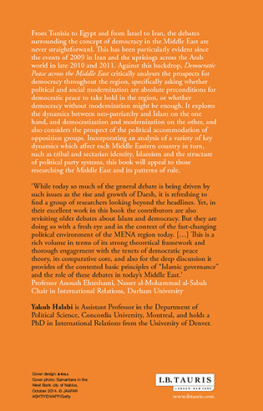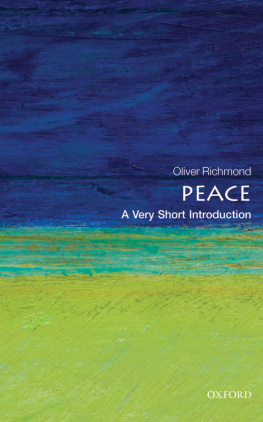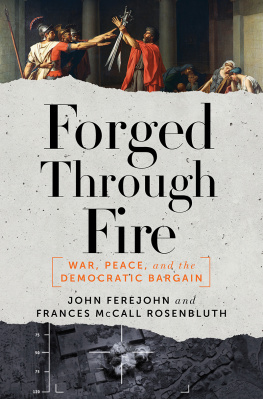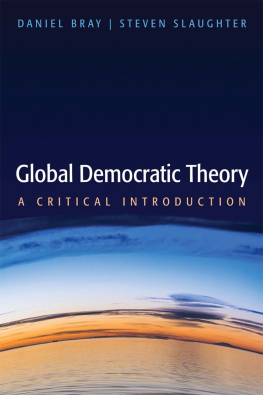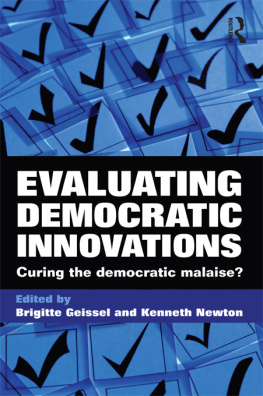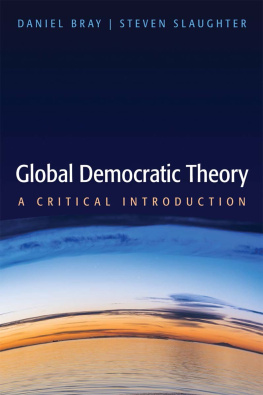2010 by The Kent State University Press, Kent, Ohio 44242
ALL RIGHTS RESERVED
Library of Congress Catalog Card Number 2009047066
ISBN 978-1-60635-031-7
Manufactured in the United States of America
Kant, Liberal Legacies, and Foreign Affairs, Parts 1 and 2 by Michael W. Doyle were originally published under the same title in the journal Philosophy and Public Affairs, V.12, 3 (pp. 205235) and 4 (pp. 323353), 1983. Copyright 1983 Princeton University Press. Published by Blackwell Publishing.
Reprinted with permission.
Library of Congress Cataloging-in-Publication Data
Democratic peace in theory and practice / edited by Steven W. Hook.
p. cm. (Symposia on democracy series.)
Includes bibliographical references and index.
ISBN 978-1-60635-031-7 (pbk. : alk. paper)
1. Democracy. 2. Peace. 3. DemocratizaionGovernment policyUnited States. 4. United StatesForeign relations1989 5. United StatesForeign relationsPhilosophy.
I. Hook, Steven W., 1959
JC423.D3813565 2010
303.6'6dc22 2009047066
British Library Cataloging-in-Publication data are available.
14 13 12 11 10 5 4 3 2 1
The deadly violence that occurred at Kent State University in the spring of 1970 shocked a statewide, national, and global audience. At home, the shooting deaths of four students by members of the Ohio National Guard shattered the university community. Coming to grips with this traumatic episode, and its larger context in the social upheavals of the Vietnam War period, has been a challenge ever since for our faculty, students, and alumni. Honoring the victims memory in a meaningful wayone that channels the lessons of the past toward greater understanding in the futurehas become an ongoing mission of Kent State and the foundational inspiration of this book.
The calamity of May 4, 1970, brought the troubling divisions between American citizens and their government into stark relief. The escalating war in Vietnam, which coincided with heightened racial conflict in many urban areas, raised concerns that went far beyond the policies of the Nixon administration. The very nature of American democracy came into question during this period as many citizens felt excluded from the political process, unable to affect change in a government that seemed increasingly dominated by special interests and the military-industrial complex. Overseas, the United States routinely violated its own democratic principles by supporting military dictatorships across Latin America, in the Middle East, and elsewhere around the world. Its conduct of the Vietnam War, whose victims included millions of civilians, frequently ran counter to the accepted principles of just war.
Subsequent research on American politics and foreign policy reflected this disillusionment with the U.S. government, which was widely revealed to be neither democratic nor peaceful on a regular basis. Political scientists such as Theodore Lowi (1969) identified institutional barriers to popular sovereignty that threatened the end of liberalism in the United States. Revisionist historians chronicled the moral lapses in U.S. foreign policy previously neglected by mainstream scholars, and political economists highlighted the gaps in global development that left countries in the Southern Hemisphere dependent on the industrialized North. More recently, linguists and sociologists have called attention to the constructed nature of political life that renders traditional American values and cultural identities problematic.
These national self-doubts, which persisted long after the Vietnam War, led Kent State University in 2000 to initiate an annual Symposium on Democracy. Since then leading scholars have come to campus each year to share their knowledge on the relationship between democracy and religion, globalization, homeland security, the arts, and other topics. This volume comes out of the eighth annual symposium, held in May 2007 and entitled Democracy and Peace: Historic Links and Implications for World Order.
As organizer of the conference, I believed the time had come to revisit the theory of democratic peace, which claims that governments that respect the political liberties of their citizens, while frequently warlike in their relations with repressive or authoritarian regimes, observe a separate peace with one another. This empirical link between democracy and peace is widely considered to be a virtual law of international relations, and the theory maintains a normative appeal for its emphasis on political reform and human rights. To take part in this venture, I sought out leading scholars from a wide range of theoretical and methodological traditions who were active in the discourse on democratic peace.
Taking stock of the theory seemed especially appropriate given the turbulence of the early twenty-first century. While the preventive U.S. invasion of Iraq in March 2003 did not violate the assumptions of democratic peace theory, since the target was a repressive state, the actions taken by the United States revived many of the questions raised in the backlash against the Vietnam War. Was this a war of necessity or choice? What national interests were at stake that compelled U.S. military intervention, and how compelling was the evidence used to justify the use of force? How honest were the nations leaders as they sought public support for the war, and how open were they to contrary evidence and dissenting views? Finally, how has the conduct of this war, which continues today, along with the conflict in Afghanistan, reflected the moral principles that justified U.S. military intervention?
The authors of the chapters in this volume consider these and other questions in probing the many facets of democratic peace theory. The book is divided into two sections. The first explores the underlying logic and validity of the theory. The second section examines the ways in which governments, particularly the United States during President George W. Bushs global war on terror, have explicitly or implicitly relied on the theory to justify the promotion of democracy overseas by a variety of measures, including the use of military force.
A point of departure for our symposium, and for this book, is the two-part study authored by Michael Doyle in 1983 that reignited scholarly research and debate about the theory and practice of democratic peace. Both parts of the study, organized along the same lines as this project, are reprinted verbatim at the opening of each section of this book. Readers are urged to use Doyles seminal analysis as a guide to the current chapters that assess our subsequent understanding of the theory. The authors were chosen for their diversity of personal backgrounds, research methods, and theoretical perspectives, creating for the symposium and the book a microcosm of the democratic peace research community.
It has often been noted that democratic governments, while maintaining peaceful relations with one another, are not only war-prone toward repressive governments but are often poorly equipped to prepare for and fight wars. As Quincy Wright, whose Study of War (1942: 842) informed a generation of security studies, observed, Democracies normally require that important decisions be made only after wide participation of the public and deliberate procedures which assure respect for the law and freedom of criticism before and after the decision is made. They are, therefore, ill adapted to the successful use of threats and violence as instruments of foreign policy. Consequently, in the game of power diplomacy, democracies pitted against autocracies are at a disadvantage.

